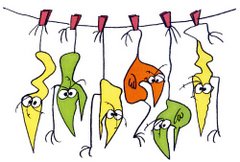© 2007-2021

G@ttoGiallo
November 06, 2009
November 03, 2009
In Memoriam - C. Lévy-Strauss
 Claude Lévy-Strauss
Claude Lévy-Strauss
(Brussels 1908/Paris 2009).
The father of modern anthropology.
(europeimages)
Return to the Amazon.
___
by
[G@ttoGiallo]
at
1:08 pm
0
comments
![]()
Tags: amazon, anthropology, claude levy-strauss, science
October 31, 2009
Back on La Pigna hill in Sanremo...
I've already reported a first visit up to the Sanremo ancient area in
a previous post. I was recently back there and up the hill to enjoy
its particular atmosphere and take a closer look to the huge fig trees
that thrust their roots into the crevices of that rocky ground.
The Ficus macrophilla, commonly known as the Moreton Bay fig is a
large evergreen banyan tree of the Moraceae family, subsection of the
Malvantherae.
Its specific epithet macrophylla is derived from the ancient Greek makro
(large) and phyllon (leaf) and refers to the size of the leaves. 

The characteristic "melting" appearance of the Ficus macrophylla is due
to its habit of dropping aerial roots from its branches which on reaching
the ground thicken into supplementary trunks which help to support the
great weight of its crown. 
The trunk can be massive, with thick, prominent structure and a rough
grey-brown bark. Some trees can reach heights of 60 m.
Currently the tallest Moreton Bay Fig (49 m) is found near Egg Rock, in
Queensland, Australia, but even Europe exhibits some sizeable
naturalized specimen.
___
(More on > Wikipedia).
by
[G@ttoGiallo]
at
10:48 pm
0
comments
![]()
Tags: ficus macrophylla, italy, la pigna hill, sanremo, travels
October 28, 2009
Female Nephila komaci, the hugest webweaving spider.
The Nephila komaci can be found in Madagascar and South Africa.
They can be up to three feet (one meter) wide and are a member
of the orbweaving spiders' group.
"In the PLoS ONE paper, Kuntner and Coddington described Nephila komaci
as a new species, now the largest web-spinning species known, and placed
it on the evolutionary tree of Nephila". (EurekAlert)

(Photos M. Kuntner)
1) a giant golden orb-web exceeding 1 meter in diameter: Nephila inaurata,
Rodrigues, Indian Ocean.
2) extreme sexual size dimorphism in Nephila spiders: Small male and large
female, Nephila pilipes, Singapore.
____
Jumping now to another site, EarthTouch, for a beautiful video, taken early
in the morning, when the sun rays make the web's threads shine like gold,
which explains the spider's name.
* Previous post on Golden orb spider.
by
[G@ttoGiallo]
at
3:45 pm
2
comments
![]()
Tags: golden orb weaver, kuntner and coddington, nephila komaci, science, spiders
October 27, 2009
Rampini the ChIndian
A brilliant journalist and writer I discovered reading "The ChIndia Empire".
Listen to March 2007 CDT interview here (en).



EuroTopics > Federico Rampini, 10 articles cited in the European Press
Review.
At Harry Kreisler's "Conversations with history".
(UCtelevision)
Born in Genoa in 1956, Federico Rampini has been a student of the liberal French
sociologist Raymond Aron at Ecole des Hautes Etudes en Sciences Sociales, in Paris
and of the economist Mario Monti at the Bocconi University in Milan.
As a journalist, he first worked for "Città Futura" in 1977, the weekly magazine of the
FGEI, when the general secretary was Massimo D'Alema and for weekly "Rinascita"
in 1979, the PCI weekly of Enrico Berlinguer.
Federico Rampini is a columnist, correspondent and editor for European affairs of La
Repubblica, since 1997.
He is a consultant at Institut Français des Relations internationales, member of the
Scientific board of the journal Critique Internationale, published in Paris by the Fondation
Nationale des Sciences Politiques and member the Italian magazine of geopolitics Limes.
He also contributed as a columnist to Le Figaro, L'Express, Politique étrangère, in France.
(more).
____
Bibliography...
by
[G@ttoGiallo]
at
11:44 pm
0
comments
![]()
Tags: federico rampini, journalist, larepubblica, writers
















